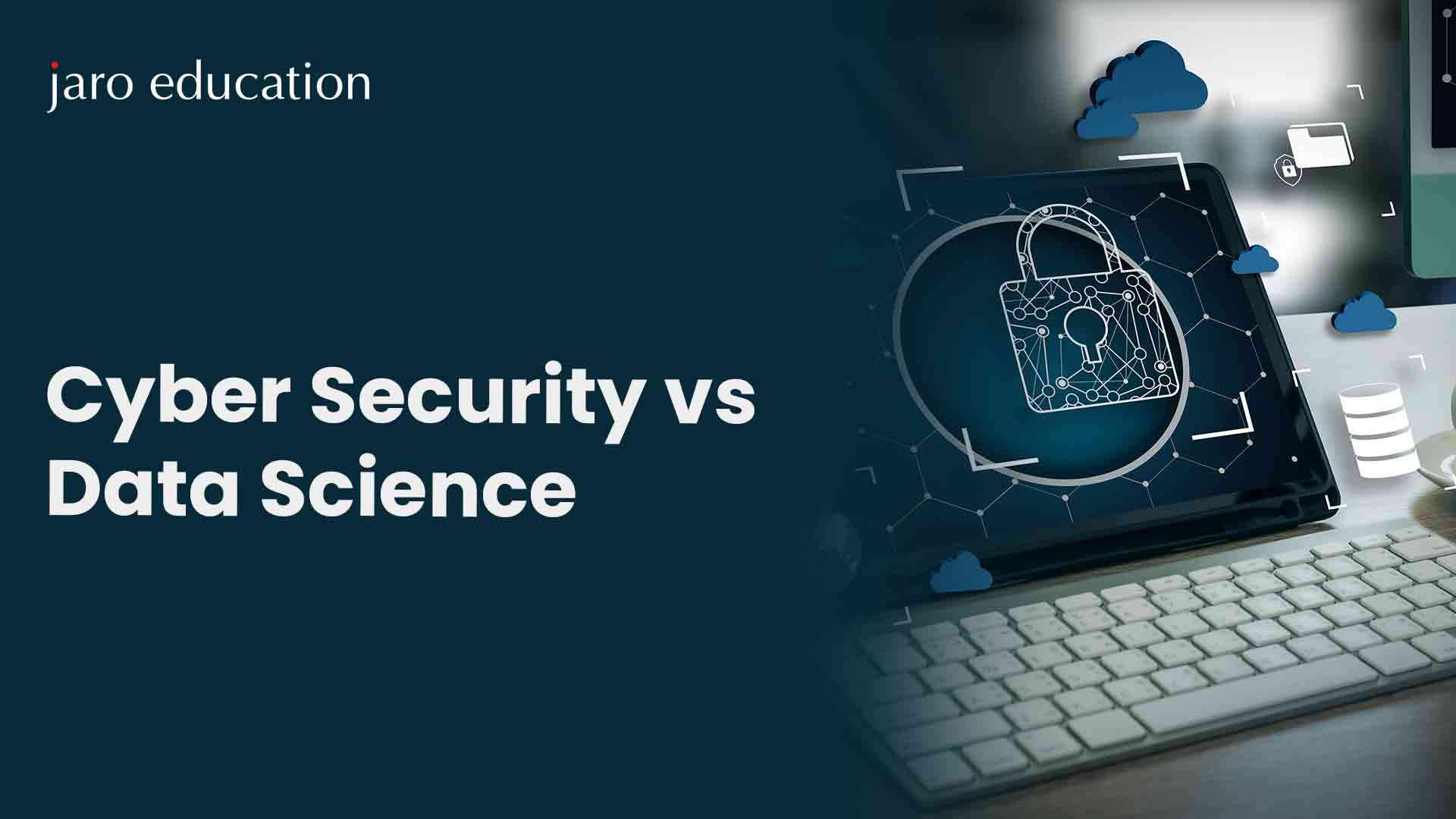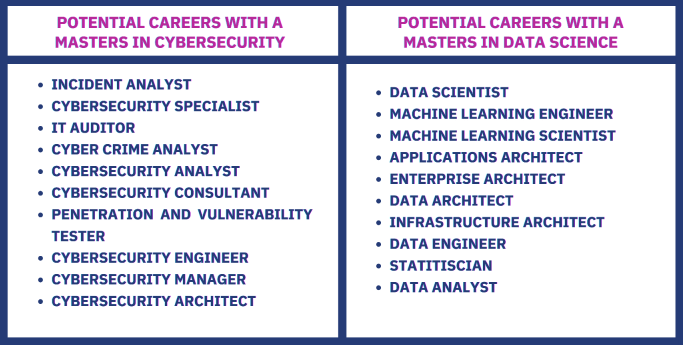
- jaro education
- 17, March 2024
- 2:00 pm
In today’s rapidly evolving digital world, cybersecurity and data science have emerged as dynamic forces, offering promising career opportunities and the potential to make a significant impact. With businesses increasingly reliant on safeguarding their sensitive information and harnessing the potential of big data, professionals skilled in these areas are in high demand. But faced with the question of which path to pursue – cybersecurity or data science – many are left wondering which offers the better career prospects.
Through this blog, you will get a clear insight into the difference between cybersecurity vs. data science, exploring their intricacies, comparing their skill sets, and analyzing their career trajectories.
What is Cyber Security?
Cybersecurity is crucial for safeguarding digital systems, networks, devices, and data against harmful cyberattacks. According to the National Institutes of Standards and Technology (NIST), cybersecurity follows a procedural framework comprising five key functions:
- Identification
- Protection
- Detection
- Response
- Recovery
Table of Contents
A significant portion of our activities occurs online, leaving behind a digital trail. We conduct shopping transactions through online platforms or applications, where we input sensitive financial details like credit card information. Social media platforms are used to share personal photos and information. Additionally, many of us work remotely, necessitating the storage and transmission of sensitive company data online, ranging from employee records to proprietary information.
As new technologies like artificial intelligence (AI) and cryptocurrency become more common, there has been a huge increase in cyber attacks – 2138 cyber attacks per organization in 2023, as per Livemint.com. This means there’s a big need for experts in cybersecurity to protect against these attacks. A report by Cybercrime Magazine says that in 2023, there were approximately 3.5 million unfilled jobs in cybersecurity worldwide. And right now, there’s basically no one unemployed in the cybersecurity field.
Importance of Cyber Security
The significance of cyber security spans across various sectors of the economy, including government agencies, military, corporate, finance, and medicine. Some of the major advantages of cyber security are:
- Safeguarding Data: Given the extensive reliance on online storage for organizational data, it is vulnerable to a multitude of threats. Adhering to best cyber security practices ensures the protection of sensitive and confidential information.
- Mitigating Loss from Cyber Attacks: Projections suggest that by 2025, cyberattacks and cybercrimes could cost the global economy approximately $10.5 trillion annually. Such incidents not only incur financial losses but also erode customer trust and damage business reputation. Effective cyber security measures are indispensable for mitigating these losses, prompting organizations worldwide to invest in hiring security professionals at competitive salaries.
- Facilitating Digitization: The proliferation of digitization has resulted in the online availability of customer data for many organizations. As companies embrace digitization to enhance customer experience, the need for robust cybersecurity measures becomes paramount. Consequently, organizations conduct cyber security training and development programs to support their ongoing digitization efforts.
What is Data Science?
Data science, as a field, entails the examination and structuring of extensive datasets in their unprocessed state. Through the systematic organization of data, experts within this domain possess the capability to refine and interpret data for entities and individuals lacking technical proficiency.
The field of data science is growing and offers many job options for people who are good at understanding and explaining data to different groups. Even though data gives important information to organizations, it can be hard for people who aren’t experts to figure it out. But with skilled data scientists, data can help make smart decisions based on evidence and improve how things work.
Importance of Data Science
- Data science has given organizational leaders the power to make decisions based on data-driven insights.
- Trend analysis stands out as a pivotal technique utilized by organizations to establish realistic and attainable objectives. Leveraging organizational data, data scientists provide recommendations and solutions to address significant business challenges effectively.
- Data science enables businesses to pinpoint lucrative opportunities by scrutinizing historical data related to customers, products, and services. Through the expertise of data scientists, organizations can explore novel avenues for expansion and success.
- At the core of organizational marketing and product strategies lies data science. By examining consumer-related data, data scientists uncover insights into consumer behavior, enabling management to strategize and make informed decisions accordingly.

*seidenbergnews.blogs.pace.edu
Roles and Responsibilities
Key Role of Cyber Security Professional
Many companies hire cybersecurity experts to make their computer systems stronger and protect their information from hackers. These experts are really important because they keep sensitive data safe from being stolen if there’s a cyber attack. They have a few main jobs: making sure the network is secure, checking for risks, making apps safer, keeping data safe, dealing with problems quickly if they happen, and teaching employees how to be safe online.
Lots of different kinds of organizations, like banks, online stores, tech companies, hospitals, and more, need help from cybersecurity pros.
Key Role of Data Scientist
Data scientists have pivotal roles in lots of different companies because they help make products and services better. They do a bunch of stuff like collecting, organizing, and looking at data to find patterns and make predictions. They also make sure that the data is all good and ready to use, and they create cool programs to analyze it.
For example, let’s say there’s a big factory. Data scientists there use special programs to check out how things are going in the factory and figure out ways to make it work better. Lots of industries like business, finance, tech, government, and healthcare really need data scientists to help them out.
Academic Essentials
Educational Requirements to Work in Cyber Security Field
If you want to work in cyber security, you’ll need to get relevant knowledge, learn practical skills, and earn certifications. Most cyber security jobs require at least a bachelor’s degree in computer science, information technology, or cyber security. Some jobs might prefer candidates with a master’s or doctoral degree, especially for higher-level positions.
Besides having a degree, you’ll also need to learn technical skills like programming languages, network security, and digital forensics. It’s also important to have good communication, teamwork, and problem-solving skills.
You can improve your cyber security skills by taking online courses or certificate courses. These courses cover topics like programming languages, operating systems, and various certifications like the PG Certificate Programme in Cyber Security Management and Data Science – IIM Nagpur. This course is designed for mid-management professionals, senior managers, CTOs, and CXO-level executives. It provides essential cybersecurity knowledge to enable systematic risk assessment and management using flexible processes, reducing reliance on specific tools.
Educational Requirements to Become a Data Scientist
To become a data scientist, you usually need to have a bachelor’s degree in computer science, statistics, math, or data analytics. Some employers may prefer candidates with a master’s or doctoral degree, especially for more advanced roles.
Besides a degree, you also need to have certain technical and workplace skills like knowing programming languages, understanding big data technologies, using machine learning techniques, statistical modeling, good communication, teamwork, and problem-solving.
You can improve your data science skills and qualifications by attending boot camps or taking online courses, getting certificates such as Post Graduate Certificate Program in Data Science – IIM Nagpur. These cover things like Python, R, SQL, data visualization, data analysis, and machine learning. Doing this helps you stay updated with the latest trends and methods in the field and shows potential employers that you know your stuff.
Career Path
Career Path in Cyber Security Field
Cybersecurity is a big and diverse field that’s growing quickly. It offers lots of chances to learn, grow, and make a difference. People in cybersecurity use their skills in programming, keeping networks safe, coding, ethical hacking, studying malware, digital investigations, and more to keep data and systems safe from cyber threats.
Cybersecurity can be used in different areas like government, finance, healthcare, online shopping, and more. There are many jobs you can do in cybersecurity, depending on what you like, what you’re good at, and what you want to achieve. Here are some common jobs and what they involve:
Cybersecurity Analyst
These folks watch out for cyber problems and react to them. They use tools like SIEM, IDS, IPS, and antivirus software to look at security events, figure out risks, and suggest ways to deal with them.
Cybersecurity Engineer
These people make and test security systems to stop, find, and handle cyber attacks. They use things like firewalls, VPNs, encryption, and penetration tests to keep networks, servers, apps, and data safe.
Cyber Security Consultant
These experts give advice on cybersecurity to different clients. They use things like audits, checks, and standards to see how safe something is and suggest ways to make it better.
Cybersecurity Manager
These folks lead teams and projects to keep things safe from cyber threats. They use things like project management and budgets to plan and carry out goals. They also use their knowledge of cybersecurity and business to make sure everything lines up with what the organization wants.
Cybersecurity Architect
These people make and keep track of the overall security plan for an organization or system. They use things like frameworks and models to make sure everything stays safe.
Career Path in Data Science
Data science is a big field that includes lots of different things like collecting, analyzing, and using data in different ways. People who work in data science use skills like programming, math, and knowing a lot about a particular subject to understand big and complicated sets of data, and then they share what they find with others. Data science can be used in lots of different areas like business, healthcare, and social media.
There are different jobs you can have in data science, depending on what you’re good at and what you like to do. Here are some common jobs:
Data analyst
Data analysts are responsible for collecting, cleaning, exploring, and visualizing data to answer specific questions or solve problems. They use tools such as Excel, SQL, Python, R, and Tableau to perform descriptive and inferential statistics, create dashboards and reports, and communicate their findings to stakeholders.
Data engineer
Data engineers are responsible for building, maintaining, and optimizing the data infrastructure and pipelines that enable data scientists and analysts to access and process data efficiently and reliably. They use tools such as Hadoop, Spark, Kafka, AWS, Azure, and SQL to design, implement, and test scalable and robust data systems and architectures.
Data scientist
Data scientists are responsible for applying advanced analytical techniques and machine learning algorithms to data to discover patterns, generate insights, and create predictive models. They use tools such as Python, R, TensorFlow, PyTorch, and Scikit-learn to perform data wrangling, feature engineering, model selection, validation, and deployment.
Machine learning engineer
Machine learning engineers are responsible for developing, deploying, and monitoring machine learning solutions that can handle large-scale and real-time data. They use tools such as Python, Java, C++, TensorFlow, PyTorch, and Kubernetes to design, implement, and optimize machine learning models and systems that can perform tasks such as image recognition, natural language processing, recommendation systems, and more. Machine learning engineers typically have a master’s or doctoral degree in computer science, engineering, or a related field and some experience in software development and machine learning.
Data science manager
Data science managers are responsible for leading, mentoring, and coordinating data science teams and projects. They use tools such as Jira, GitHub, and Slack to plan, execute, and review data science workflows and deliverables. They also use their domain expertise and business acumen to define the scope, objectives, and requirements of data science projects and communicate them to stakeholders.
Salary
Lorem ipsum dolor sit amet, consectetur adipiscing elit. Ut elit tellus, luctus nec ullamcorper mattis, pulvinar dapibus leo.
| Experience | Expected Salary |
|---|---|
| Entry-level | ₹4,77,893 - ₹9,00,000 |
| Mid-career | ₹ 11,90,000 |
| Senior-level | ₹14,00,000 |
Salary in Data Science
| Job Title | Experience | Salary Range (per year) |
|---|---|---|
| Data Scientist | 2 - 4 years | ₹6L - ₹20L |
| Senior Data Scientist | 2 - 4 years | ₹16L - ₹30L |
| Lead Data Scientist | 5 - 7 years | ₹20L - ₹35L |
| Principal Data Scientist | 8+ years | ₹25L - ₹55L |
*Glassdoor.com
Collaboration of Cyber Security and Data Science
Cybersecurity and data science are closely related fields that work together in many ways. Here are five points explaining how they collaborate:
- Data science helps find weaknesses in systems by analyzing large amounts of data. Security software like VPNs then uses this information to protect the network from potential threats.
- Data science uses machine learning to predict if there might be an attack based on past data. It creates algorithms to spot patterns from previous attacks and give warnings about the system’s reliability.
- Data science can detect unusual behavior on a network using behavioral analytics. This helps cybersecurity professionals respond quickly to any suspicious activity.
- Data science helps manage vulnerabilities by predicting potential risks. This allows cybersecurity experts to prioritize their actions and make their operations more efficient.
- In case of a security breach, data science assists in incident response. It helps gather and analyze relevant data to figure out what caused the breach and provides recommendations for fixing and preventing it from happening again.
Conclusion
The choice between pursuing a career in cybersecurity or data science ultimately depends on individual preferences, skills, and career aspirations. Both fields offer promising opportunities and challenges, with potential for growth and fulfillment. It’s essential to carefully assess personal strengths, industry demand, salary potential, and stay updated on industry trends to make an informed decision. Whether one chooses cybersecurity or data science, both paths offer significant potential for a rewarding professional journey.










6 thoughts on “Cyber Security vs. Data Science: Which Field is Best for You?”
Excellent comparison between cybersecurity and data science! Your clear explanations make understanding the differences easy. Thanks for the informative article!
We’re delighted that the comparison was helpful! It’s great to hear that our explanations made the topics clearer.
Insightful comparison between cyber security and data science! Your article provides clarity on these critical fields. Thank you for sharing this valuable insight.
We’re pleased to hear that you found the comparison insightful! Our aim is to provide clear and valuable information.
We’re glad you found the information useful! We’ll continue to share helpful content. Stay tuned for more updates.
Great comparison of cybersecurity and data science! Your clear explanations and insights make it easy to understand the distinctions and overlaps. Thanks for the informative post!